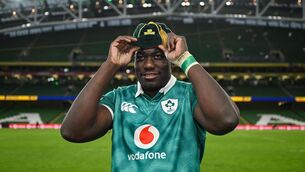The world needs heroes with human frailties

Rory McIlroy and Shane Lowry at the Zurich Classic of New Orleans in Avondale, Louisiana, earlier this year. Picture: Jonathan Bachman/Getty Images
Rory McIlroy and Shane Lowry are among the most famous Irish sporting superstars at present. McIlroy recently became the sixth golfer to complete a career Grand Slam by winning the four most prestigious competitions in professional golf – the Masters tournament, the PGA championship, the US Open and the Open Championship. It was a huge achievement as only five other golfers in the history of golf – Tiger Woods, Jack Nicklaus, Ben Hogan, Gene Sarazen and Gary Player – had reached that level of achievement.
McIlroy’s recent elevation to the golfing superstars Hall of Fame caught the public imagination as it took him almost 15 years to win the Masters and, during that long winter of his golfing discontent, he had come frustratingly close on a number of occasions to the Holy Grail of golf.
Lowry, though not in the same category of golfing expertise as McElroy, is nonetheless a very successful golfer and has already won one major (British Open) and is having a very successful season, achieving a number of top-ten finishes. McIlroy, however, has won four Majors and 44 professional wins, is ranked second in the golfing world, is worth $250 million and owns his own jet. By comparison, Lowry has one major, nine tournaments and is now ranked eighth in the world.
McIlroy and Lowry are good friends having risen together through the ranks of Irish golf and are, deservedly, held in high esteem by the Irish golfing public and indeed by the Irish people. Both are personable, of a bright sunny disposition and have achieved in a relatively short number of years an eminence and a respect that is richly deserved.
Recently, in a tournament in which both were expected to perform well, things went awry for them. Rory McIlroy had a hissy fit after he had used a golf club that wasn’t within the official specifications (as others had as well) but he was peeved that he had received negative publicity whereas others hadn’t. As a result, he refused to attend the usual post-round rituals of submitting to some media interviews. The golfing world wasn’t well pleased.
Lowry’s frustration with a disappointing round and the quality of the course saw him lashing out at the focus of his ire and using the ‘F’ word for emphasis. Neither golfer acquitted themselves well in their loss of control - though it wasn’t on either part in any sense a fall from grace. Anyone who plays golf or knows golf wouldn’t be surprised at golfers of more modest ambitions and of the most laconic disposition losing their cool on the golf course. It happens, I suspect, to most golfers. Been there and done that. But, with McIlroy and Lowry, there was a vague sense that somehow some people felt let down by the golfing duo hero-worshipped by so many.
Heroes, of whatever kind, are not allowed to have an off-day or to provide any evidence of even the least character flaw that might show them in anything other than a favourable light. But that’s what we do with our heroes - golfing or otherwise. We delude ourselves into imagining that our heroes are not susceptible to ordinary frailties of humankind because we create an illusion around them.
I remember many years ago watching an interview with the actor Larry Hagman who was the bad guy, one JR Ewing, in an American television series, . Hagman relayed how people would approach him in the streets and tick him off about the way he was treating his long-suffering wife, Sue Ellen. Hagman laughed about the inability of some people to distinguish between what was real and was illusional. I think it was Gay Byrne (who else was there at the time?) who asked Hagman did it upset him? Hagman laughed and suggested it was well worthwhile for him provided his bosses kept paying him so much money!
Television at the time was new to a lot of people's moral and other dilemmas in (and other series) were analysed and discussed at every gathering. Times have changed and actors like Larry Hagman are not such exotic creatures living in such a make-believe world as we used to think. Hagman didn’t bat an eye-lid that the public didn’t like him but nowadays it can matter for ‘stars’ or ‘celebrities’ or ‘influencers’ not just to be popular but to effectively create an illusion of significance and sophistication that they decide is a profile that they actively conspire to present in public.
Sometimes too significance and sophistication can be artificially created. For example, there is now a rash of ‘podcasts’ – effectively conversations that can be downloaded from the internet and played on a computer or a mobile phone. More often than not ‘podcasts’ are little more than a conversation between two ‘podcasters’ or ‘influencers’. The podcast is a product of the ‘celebrity culture’ where once-noted individuals can create an illusion of expertise and attribute to themselves a significance that is artificially generated. While it sometimes smacks of a certain desperation – often artificially extending a fairly insignificant career – podcasts supply a variety of interest groups with ‘expert’ commentary on every aspect of life.
But while podcasts have a limited agenda and rely to a large degree on self-promotion, there is another level at which individuals invent a persona for themselves through carefully being packaged for the public by media experts and communications consultants.
What is created is, as if with mirrors, an illusion of significance, part of a celebrity culture that depends on a gullible public to invest in individuals who facilitate the creation of a cultural, social or political environment that airbrushes into existence a shared mythology. There are multiple examples of the celebrity endorsement of pointless merchandise that only help to separate the gullible from their money.
In a culture laced with such studied deception and illusion, the occasional outbursts of sportsmen like Rory McIlroy and Shane Lowry seem not just natural but even refreshing.




